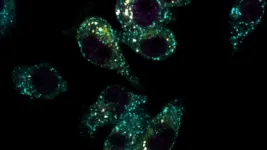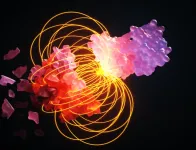(Press-News.org) Monash University researchers have discovered a key mechanism in the body’s immune system that helps control the inflammatory response to infection. The discovery could help pave the way for more targeted therapies in a range of inflammatory conditions, such as autoimmunity and neuroinflammatory disease.
The innate immune system is the body’s first line of defence against pathogens. Innate immune proteins detect foreign bodies such as bacteria and viruses and respond by mounting a protective inflammatory immune response to destroy the invading pathogen.
A tightly regulated inflammatory response that is precisely turned on and then off is key for host protection against infection. However, in some instances these pathways can be unnecessarily switched on and not off, effectively leading to autoimmune and neurodegenerative diseases.
Research published in The EMBO Journal studied the complex chain of events involved in the inflammatory response that is mediated by a key innate immune protein Stimulator of Interferon Genes (STING).
Monash Biomedicine Discovery Institute’s (BDI) Senior Researcher Dr Dominic De Nardo explained the significance of the findings.
“The innate immune system is ancient in our evolutionary history and is very robust,” Dr De Nardo said.
“The different components within the system are involved in detecting pathogens, mounting an inflammatory immune response, which should ultimately aid in the clearance of the threat, then signalling to the system that it’s time to shut off the inflammation.
“My group focuses on inflammatory responses induced by a central innate immune receptor – called Stimulator of Interferon Genes, or STING – that can alert the body to danger from pathogens, or be turned on by factors from within our own body that appear in the wrong place.
“The goal is to slow down and stop damaging inflammation in disease, driven by unwarranted turning on and/or inefficient shutting off of STING. We are looking forward to advancing this research further into human immune cells and pre-clinical studies.”
First author and recently graduated PhD student, Dr Kate Balka, said the team wanted to understand how STING immune responses were regulated to ensure effective host immunity.
“We know on the one hand that STING responses are crucial for clearing pathogens, but on the other, unrestrained STING activity causes several inflammatory diseases including autoinflammatory, autoimmune and neurodegenerative conditions,” Dr Balka said.
“In other words, we wanted to understand and answer the question, how is STING turned off?”
The researchers determined the precise mechanisms controlling the termination of STING responses.
“In this study we have determined the molecular machinery, known as endosomal sorting complex required for transport (ESCRT), that packages STING into small compartments to allow it to be degraded, or broken down, by the lysosome – the cell’s ‘trash compactor’,” Dr De Nardo said.
By understanding this critical step of STING regulation, new avenues for potential therapeutic targeting of STING in disease pathologies can be pursued.
Read the full paper, published in The EMBO Journal, titled Termination of STING responses is mediated via ESCRT-dependent degradation
DOI: 10.15252/embj.2022112712
YouTube video, Trafficking of STING to its demise: Dr Dominic De Nardo: https://www.youtube.com/watch?v=asB4r_7SgJA
Fluorescent version of STING (mRuby3-STING) imaged in live immune cells via spinning disk microscopy. Activated STING localises at the Golgi and then moves to endosomal regions, which will eventually mediate STING degradation. Data was generated by Dr Kate Balka in the De Nardo group.
About the Monash Biomedicine Discovery Institute
Committed to making the discoveries that will relieve the future burden of disease, the Monash Biomedicine Discovery Institute (BDI) at Monash University brings together more than 120 internationally-renowned research teams. Spanning seven discovery programs across Cancer, Cardiovascular Disease, Development and Stem Cells, Infection, Immunity, Metabolism, Diabetes and Obesity, and Neuroscience, Monash BDI is one of the largest biomedical research institutes in Australia. Our researchers are supported by world-class technology and infrastructure, and partner with industry, clinicians and researchers internationally to enhance lives through discovery.
END
Escorting a key immune protein to its demise to control inflammation
2023-05-04
ELSE PRESS RELEASES FROM THIS DATE:
Nutrition research continues to support the health benefits of regular watermelon consumption
2023-05-04
There’s no question that watermelon is both delicious and nutritious, but new research underscores this nutrient-rich fruit’s contributions to overall diet quality and heart health.
A recent study published in Nutrients suggests that watermelon can increase nutrient intake and overall diet quality in both children and adults.1 The study analyzed National Health and Nutrition Examination Survey (NHANES) data and found that total diet quality was higher in watermelon consumers as compared to non-consumers. ...
National Comprehensive Cancer Network honors cancer leaders who guide the future of care
2023-05-04
PLYMOUTH MEETING, PA [May 4, 2023] —The National Comprehensive Cancer Network® (NCCN®) has announced the 2023 recipients of awards honoring individuals who made a remarkable difference in improving the lives of people with cancer over the past year.
2023 NCCN Award Recipients:
Theresa J. Franco, MSN, RN, Vice President, Cancer Clinical Operations, Nebraska Medicine
NCCN Board of Producers Award recipient for exemplary service of NCCN’s mission
F. Marc Stewart, MD, Professor, Vice Chair, Department of Hematology and ...
Local entrepreneurs tackling social change, health inequity invited to apply for financial grants
2023-05-04
DALLAS, May 4, 2023 — A recent study revealed that, in the United States, Black and Latinx entrepreneurs receive only 2.6% of venture capital investment. [1] The American Heart Association®, the world’s leading nonprofit organization focused on longer, healthier lives for all, has opened the application window for submissions to the EmPOWERED to Serve Business Accelerator™. The Accelerator program has been established to support local communities, small businesses, social entrepreneurs and innovators who are working to increase health equity and create groundbreaking social change at the zip code level.
Now in its seventh year, the Business ...
Marine seagrass meadows show resilience to ‘bounce back’ after die-offs
2023-05-04
In Florida alone, thousands of acres of marine seagrass beds have died. Major seagrass die-offs also are occurring around the world. Stressors such as high temperature, hypersalinity and hypoxia or lack of oxygen affect seagrasses’ ability to resist and recover from these stressor-related mortality events or when disturbances lead to seagrass die-off events.
Seagrass die-offs also are linked to exposure to sediment-derived hydrogen sulfide, a well-known phytotoxin that accumulates as seagrass ecosystems become more enriched in nutrients. While hydrogen sulfide intrusion into seagrass tissue is considered a leading cause of recurring mortality ...
Engineering molecular interactions with machine learning
2023-05-04
In 2019, scientists in the joint School of Engineering and School of Life Sciences Laboratory of Protein Design and Immunoengineering (LPDI) led by Bruno Correia developed MaSIF: a machine learning-driven method for scanning millions of protein surfaces within minutes to analyze their structure and functional properties. The researchers’ ultimate goal was to computationally design protein interactions by finding optimal matches between molecules based on their surface chemical and geometric ‘fingerprints’.
Four years later, they have achieved ...
High school students learn the basics of base editing to cure “GFP-itis”
2023-05-04
Genome editing is used to modify the genes of living organisms to elicit certain traits, such as climate-resilient crops or treating human disease at the genetic level. It has become increasingly popular in agriculture, medicine and basic science research over the past decade, and will continue to be relevant and utilized well into the future. Given this prevalence, researchers at the University of California San Diego have started an outreach program that introduces genome-editing technologies to high school students.
Assistant Professor of Chemistry and Biochemistry Alexis Komor, and Ph.D. candidates Mallory ...
Awardees named for $15 million research project on CVD health impacts of chronic stress
2023-05-04
DALLAS, May 4, 2023 — Teams of research scientists from three universities will lead an innovative $15 million project to study the biological mechanisms of chronic stress that can increase cardiovascular disease risk. The Strategically Focused Research Network (SFRN) on Biologic Pathways of Chronic Psychosocial Stressors on Cardiovascular Health of the American Heart Association, the world’s leading voluntary organization dedicated to a world of longer, healthier lives, will focus on learning more about how the body responds to chronic stress, as well as how certain interventions may help reduce health risks.
Chronic stress is recognized as an independent ...
Understanding self-directed ageism
2023-05-04
The study led by Professor Julie Henry from UQ’s School of Psychology looked at why self-directed ageism is common.
Cognitive changes make it difficult for older people to challenge internalised ageist beliefs.
Image: Adobe.
“Older people are regularly exposed to ageism such as negative assumptions about their worth, capacity or level of understanding, as well as jokes about older age,” Professor Henry said.
“At the same time, as we grow older, we rely more strongly on prior knowledge and cues from our environment to guide how we feel, think and ...
Amsterdam UMC leads an AI-powered hunt for high-risk vascular patients
2023-05-04
Every year 18 million people die from cardiovascular disease. Making it the deadliest disease in the world. Currently studies focus mainly on the heart, leaving the influence of vascular disease on these large numbers of deaths often out of sight. Despite vascular disorders being a trustworthy indicator for death from heart disease.
VASCUL-AID, a large European study led by Amsterdam UMC, will therefore focus on using AI to predict the worsening of vascular disease in people with an aortic aneurysm or peripheral ...
Chimpanzees combine calls to communicate new meaning
2023-05-04
Similar to humans, chimpanzees combine vocalizations into larger communicatively meaningful structures. UZH researchers suggest that this ability might be evolutionarily more ancient than previously thought.
A key feature of human language is our ability to combine words into larger compositional phrases i.e. where the meaning of the whole is related to the meaning of the parts. Where this ability came from or how it evolved, however, is less clear.
Chimpanzees, our closest-living relative, are known to produce a number of different vocalizations to manage their ...




